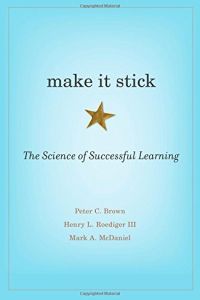Melden Sie sich bei getAbstract an, um die Zusammenfassung zu erhalten.

Melden Sie sich bei getAbstract an, um die Zusammenfassung zu erhalten.
Peter C. Brown, Henry L. Roediger III and Mark A. McDaniel
Make It Stick
The Science of Successful Learning
Belknap Press, 2014
Was ist drin?
A scientific, research-based examination of the best ways to teach, study and learn.
Recommendation
Professors Peter Brown, Mark McDaniel and Henry Roediger share insights from decades of learning research. Their work suggests that the majority of learners and teachers still practice outdated methods. These include the obvious: Don’t cram for exams – space out learning instead. But other techniques – such as mixing up the concepts and steps of a complex skill or knowledge set instead of mastering one element before moving on to the next – are less intuitive. Nevertheless, the authors’ research proves the nontraditional techniques are more effective than earlier approaches. The structure of the book reflects the professors’ advice, repeating ideas frequently and mixing concepts. This makes reading it harder – but it may make the ideas stick.
Summary
About the Authors
Washington University in St. Louis psychology professors Henry L. Roediger and Mark A. McDaniel study the psychology of learning. Peter C. Brown lives and writes in St. Paul, Minnesota.


















Comment on this summary